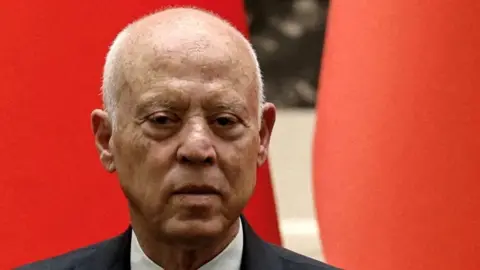Just two candidates approved to challenge Tunisia president
 Reuters
ReutersTunisia's electoral commission has approved just three candidates to run in next month's presidential election ignoring a court ruling to reinstate three others.
Among those approved are President Kais Saied and Ayachi Zammel, whose campaign team had earlier said had been arrested on Monday.
The president faces accusations of trying to restrict the number of those allowed to run against him.
Since he won his first term in 2019 Mr Saied has suspended parliament and concentrated power in his hands.
Last week, the country's highest court said three candidates who had been barred from running by the electoral commission should be allowed to participate.
Farouk Bouasker, the head of the commission, had said he would look at the court's ruling before making a decision.
In a statement quoted by the AFP news agency, the commission said that the court had not officially communicated its ruling within the deadline.
Ignoring the court's ruling is likely to cast further doubt on the credibility of the vote, BBC Middle East editor Sebastian Usher reports.
For many Tunisians, all this is yet another sign of how far they feel their country has moved away from the democratic path it embarked upon after the Arab Spring in 2011, he adds.
New York-based rights group Human Rights Watch said in August that the authorities had excluded eight other prospective candidates for the 6 October election through prosecution and imprisonment.
Mr Zammel's campaign team, which said he was accused of falsifying details of those who backed him, dismissed the allegation as "absurd", the Reuters news agency reports.
In 2021, after sacking the prime minister and suspending parliament, President Saied pushed through a new constitution cementing his one-man rule.
The new constitution replaced one drafted soon after the Arab Spring, which saw Tunisia overthrow late dictator Zine al-Abidine Ben Ali. It gave the head of state full executive control and supreme command of the army.
Mr Saied has justified his actions by saying he needed new powers to break a cycle of political paralysis and economic decay.
More BBC stories on Tunisia:
 Getty Images/BBC
Getty Images/BBCGo to BBCAfrica.com for more news from the African continent.
Follow us on Twitter @BBCAfrica, on Facebook at BBC Africa or on Instagram at bbcafrica
